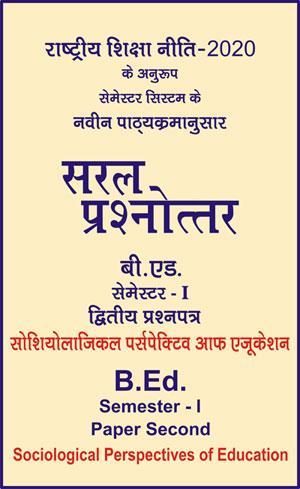|
बी एड - एम एड >> बी.एड. सेमेस्टर-1 प्रश्नपत्र-II - सोशियोलाजिकल पर्सपेक्टिव आफ एजूकेशन बी.एड. सेमेस्टर-1 प्रश्नपत्र-II - सोशियोलाजिकल पर्सपेक्टिव आफ एजूकेशनसरल प्रश्नोत्तर समूह
|
5 पाठक हैं |
|||||||
बी.एड. सेमेस्टर-1 प्रश्नपत्र-II - सोशियोलाजिकल पर्सपेक्टिव आफ एजूकेशन (अंग्रेजी भाषा मे)
Question- Describe some objections against scientific nature of Sociology.
Ans.
Nature of Sociology : Is It a Science or Not ?
Two opposite views about the nature of science : There is a great controversy about the nature of Sociology as a science. There are some critics who deny Sociology the claim to be regarded as a science. But there are others who assert that Sociology is as much a science as other social sciences like Political Science, History, Economics, etc.
Meaning of Science : A science is “a branch of knowledge or study dealing with a body of facts or truths systematically arranged and showing the operation of general laws.” It gathers facts and links them together in their causal sequence with a view to draw valid inferences. Scientific knowledge is based on reason and evidences. It is therefore variable and communicable. The chief characteristics of a science are (i) the possibility of a concise, consistent and concrete formulation, (ii) the capacity to form generalizations and make predictions, and (iii) the possibility of verification of the data as well as of the generalizations. The various steps used in the scientific method are observation, recording, classification, hypothesis, verification and prediction.
Sociology Cannot be Regarded as a Science
Those who deny the claim of sociology to be designated as a science give the following objections :
- Lack of Experimentation : If science is used in the same sense in which it is used for physical sciences, then sociology cannot claim to be a science. The term science as used for physical sciences includes the twin processes of experiment and prediction. Sociology in this sense is not a science because its subject-matter, the human relationships, we can neither catch nor see, neither weigh nor analyse in the test-tube of the laboratory. It does not possess the instruments like the microscope and the thermometer to measure the human behaviour.
There is no denying the fact that sociology cannot experiment and predict in the same way in which physical sciences do, because the materials with which society deals i.e., human behaviour and relationships are so peculiar and uncertain. There are sentiments not to be questioned. They are not even to be studied dispassionately; for example, subjects like sex life and religion evoke great controversies. An investigator dealing with a controversial subject becomes the victim of censure by those who hold different opinions. If it is prohibition, cow-slaughter, abortion, birth control or untouchability he must be either for or against them. Any dispassionate analysis by him is likely to antagonise both the sides. Furthermore, Society is so complex and variable that it is not possible to separate and analyse its different elements as can be done in physical sciences. -
Lack of Objectivity : The second difficulty of sociology in employing the scientific method is that he cannot maintain complete objectivity with the objects of his experiment as does a physicist. Man has his own prejudice and bias. It is, therefore, impossible for him to observe his subject with complete detachment. It is really difficult to dissociate ourselves from the assumptions which we have absorbed from childhood with regard to any objects. Our valuations are consequently bound to be prejudicial. Moreover, if a person tries to maintain objectivity in the study of human behaviour, he is quickly branded as an agnostic, traitor or worse. Instead of public support for his work, he may be faced with public hostility. On the safe side then he accepts certain social values and eliminate from his study the phenomenon that form a sociological point of view and are the most fundamental basis of social existence. Thirdly, social relationships cannot be studied through physical senses. What we see in social relationships is only on outward expression of our inner life ?
-
Lack of Accuracy : Another characteristic of science is that it should be able to frame certain laws on the basis of observation and hypothesis and such laws should also enable us to predict accurately. From this point of view also Sociology cannot be called a real science because firstly its laws and conclusions cannot be expressed in precise terms and secondly its prediction might not come true. Its findings are often limited in time and space. Owing to the fact that social phenomenon is too vast. Human motivations are complex, it is difficult to make predictions about human behaviour. In view of the above obstacles confronting social science it is said that there is no such thing, at best there are merely ‘social studie’s.
-
No adequate scientific terms : It has also been argued that Sociology suffers from inexact and clear terminology. Same words convey different meaning to different persons, for example, the terms ‘caste’ and ‘class’ have not yet acquired exact meaning. The recent judgement of the Supreme Court in the Mandal case has held that the concept of class cannot be separated from caste. Is caste a class ? The confusion has not yet been removed. Words are essential tools of thought, scientific or otherwise. Sociology has not yet developed an adequate set of scientific terms. Many of our terms like religion, caste, class, groups are words found in daily use. Until we cease to employ terms with vague meanings, our terminological inefficience will remain an obstacles in the way of sociology developing into a science.
|
|||||














